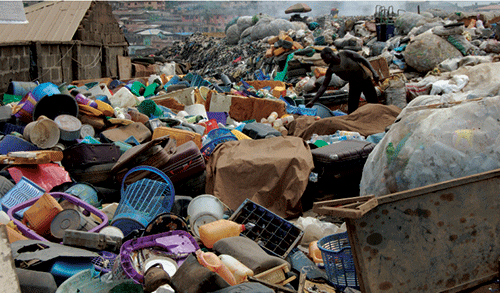By Kelechi Mgboji
Lagos is assuming a sobering notoriety of a Scraps Empire.
Youths feed from scraps in the fabled centre of excellence. Nay, they are turning scraps into a source of livelihood, with an income of N100,000 per month that competes with the salary of middle class folks who work in air conditioned offices.
On the streets and highways of the mega city, millions of youths, mainly from the North, burrow in heaps of waste full of stench, in search of scrap aluminum, iron, copper wire, plastics and other asorted materials considered worthless by many.
Far from the general perception that they are hungry and beggarly, the men – known as ‘bola boys’ – turn in over N50 billion yearly in raw materials to recycling plants.
The bola boys told TheNiche that steel rolling companies recycle scrap iron as raw materials following the near collapse of Iron Ore Mining Company and others like it.
Buyers include African Foundries Limited which hopes to commence export of about 500,000 tonnes of iron ore to African countries, and Delta Steel Rolling Company, Alaja, which has capacity to roll out 1.5 million tonnes.
Scrap plastic are cheaper for plastic manufacturers to recycle as new.
Over 5,000 youths are employed in the scrap business in the Idi-Araba, Lagos zone patronised by hundreds of dealers. In the Mile 2-Badagry Road zone, over 2,000 are employed.
One of them, Kabiru Aliu, who plies his business at Alakija bus stop, on the Badagry-Mile 2 expressway, said the two zones constitute less than 10 per cent of the dealers.
The trade is a convenient hold-all for unemployed (mostly) Hausa youths, mixed with a few Igbo and Yoruba, as well as nationals from Ghana, Benin Republic, and Niger.
Aliu said iron scraps sell for between N30,000 and N35,000 per tonne and a truckload of scrap aluminum costs about four times that.
Scrap aluminum costs N120 per kilogram, iron and plastics N30 per kilogram. “But that is company price. We buy in small quantities which at the end of the day add up to any amount.
“Usually, we buy cheaper and sell higher to companies. But sometimes we sell at a loss especially when the measured weight of scraps drops,” explained Aliu, who hails from Borno State.
He said hundreds of truckloads of scraps worth millions of naira are sold to Chinese companies in Ikeja, Mile 2, or Ikorodu each week.
“In a year, truckloads of scraps in Lagos could turn in over N50 billion. Aluminum scraps are like hot cakes with most companies scrambling for them. I can’t wait to gather up to a tonne because companies come here looking for them, and once they are up to 500 kilograms, I sell.
“I don’t have to hire a vehicle to carry them to the companies because they come here looking for them and the price is far higher than the price of scrap iron. And it is scarce to get disused aluminum materials to buy.”
Yahaya Umar, another scrap iron scavenger, who goes about it around the Satellite Town, Festac and Amuwo-Odofin areas of Lagos, disclosed that he makes about N6,000 a day, N30,000 a week, and at least N100,00 per month.
His brother is also into it, he added.
For Halla Bukar, the business is lucrative and also a source of employment to especially Northern youths, whom he said face difficult times because the governments in the region have abandoned them.
Bukar is married with children. He has more than 30 ‘bola boys’ scavenging for him.
“From these wastes, we have been able to provide for our families back home. We have been in this business for many years,” he disclosed.
The Alakija zonal Chairman of the Scrap Dealers Association, Yahaya Al-Hassan, appealed to officials of the Kick Against Indiscipline (KAI), Lagos Waste Management Agency (LAWMA) and the Ministry of Environment, to stop harassing them, since they help rid Lagos of scraps that litter the streets and block drainage channels.
His words: “Our boys go about picking up and buying scraps and iron that otherwise could have littered the city. So, we are helping to keep Lagos State clean. The government should realise that we are working to keep Lagos clean.” Instead of harassing the bola boys and restricting their operations, he argued, the government should encourage them since the business provides employment to millions of youths.
Despite scavenging in dirt and mud, picking out scraps buried in the soil, the dealers said they are proudly and gainfully employed, and are making a decent living.
Their children and relations are also in the business, they said.
The main risk, Al-Hassan explained, is that some people steal and sell scraps. He advised patrons not to buy from those who decline to issue receipt and give their phone number.




